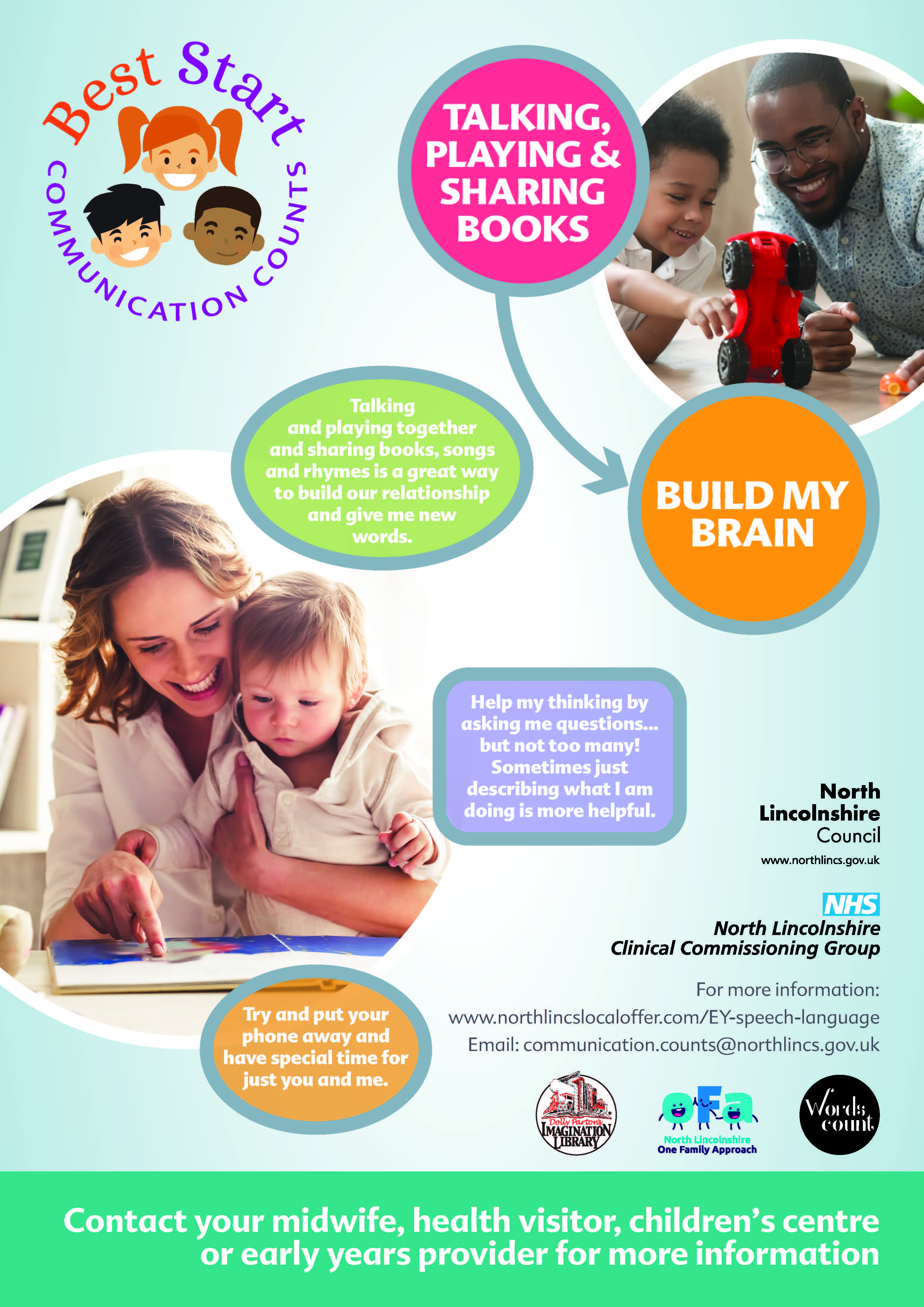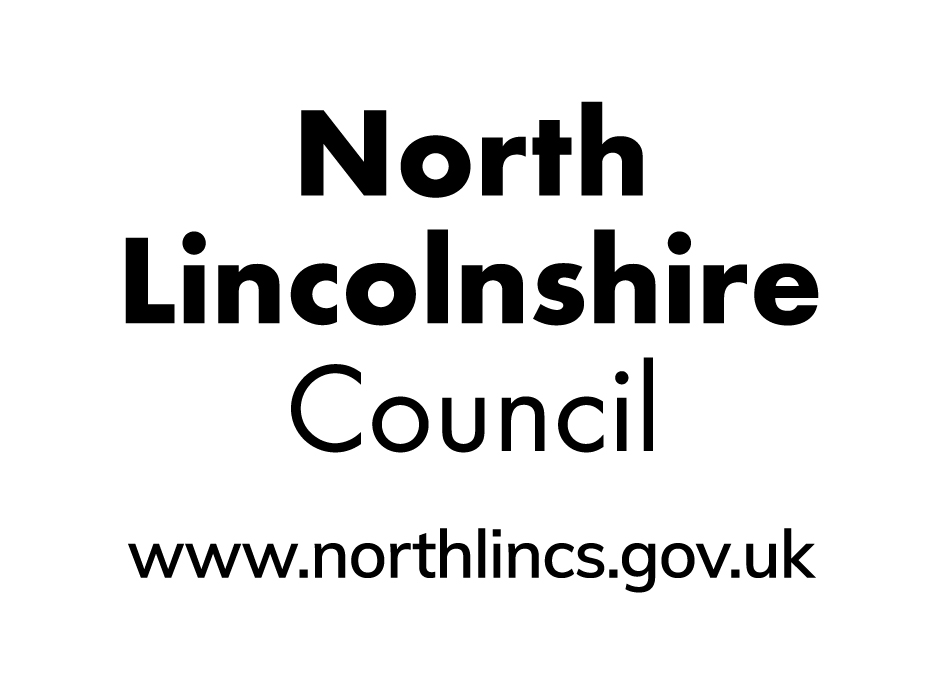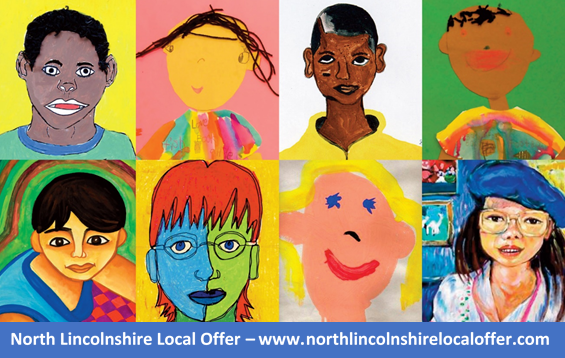Communication Counts - supporting communication, speech and language in the early years

Communication Counts is an exciting integrated community and workforce strategy. It aims to ensure all our children in North Lincolnshire have access to high quality communication and language environments across the conception to five period and beyond.
Supporting children’s communication, speech and language
Children’s communication and language underpins all of their learning and development. The earliest years of a child’s life, starting even before a baby is born, are crucial in how children’s communication, speech and language develops. Parents, carers and families have a big impact on this – talking with your baby and child, taking turns in conversations, sharing books and rhymes, and giving them new words all helps them learn to communicate and talk well.
Our Best Start Communication Counts posters have been developed by a range of North Lincolnshire professionals across health, speech and language therapy and early years education. They are based on evidence and research to support your baby and child to have the Best Start in communication.
Each poster has important messages and tips that will support your baby and child’s healthy brain development, communication, speech, language and learning.
(If you would like these posters in an accessible format, please contact us)

Imagination Library
Our Communication Counts strategy works closely with the North Lincolnshire Imagination Library.
All children under five in North Lincolnshire can receive a free book every month from Dolly Parton’s Imagination Library. Each month a new, carefully selected book will be delivered to your home and addressed to your child. Best of all it is a free gift! There is no cost or obligation to your family.
The programme is available across the whole of North Lincolnshire. All children from birth to five years who live in North Lincolnshire are eligible to register. Sign your child up from birth and they’ll receive 60 books in total to help start a lifelong love of books and reading.
Communication and language development in the Early Years Foundation Stage
Communication and Language Development is one of the three prime areas of the Early Years Foundation Stage for children from birth to the end of the reception year in primary school. This includes children’s:
- listening
- attention
- understanding
- speaking
The development of children’s spoken language underpins all seven areas of learning and development. Children’s back-and-forth interactions from an early age form the foundations for language and cognitive development. The number and quality of the conversations they have with adults and peers throughout the day in a language-rich environment is crucial.
By commenting on what children are interested in or doing, and echoing back what they say with new vocabulary added, practitioners will build children’s language effectively. Reading frequently to children, and engaging them actively in stories, non-fiction, rhymes and poems, and then providing them with extensive opportunities to use and embed new words in a range of contexts, will give children the opportunity to thrive. Through conversation, story-telling and role play, where children share their ideas with support and modelling from their teacher, and sensitive questioning that invites them to elaborate, children become comfortable using a rich range of vocabulary and language structures.
For further information please see the following links:
- Early Years Foundation Stage Framework
- EYFS: Resources, activity ideas and advice for teaching communication and language to early years children
- Foundation Years website (DfE)
- What to expect in the EYFS – A guide for parents
Supporting children with speech and language concerns – information for parents and carers
All professionals working with your child such as health professionals, Children’s Centre staff and early years practitioners can provide you with information on supporting Communication and Language and how to access support, as part of the North Lincolnshire Communication Counts strategy.
These professionals also play an important role in working with parents and carers to identify when children have an emerging need. All children will have an assessment of their development, including their communication and language development, at age two. This will be carried out by your health visiting team and your child’s early years provider if they attend one. If your child needs some additional support, they will talk to you about this, help you to implement strategies and activities to promote communication and language, and monitor your child’s progress. If concerns continue and it is deemed more specialist advice is required, they will, after agreement with you, discuss this with an Early Years Speech and Language Therapist or make a referral to the team. You will be kept up to date about this at all times.
In some instances, an Early Help Assessment will be required to gain further information to ensure the right support is put in place.
Read the NHS Speech and Language in early years [PDF, 186Kb] document for further information for parents.
Communication Counts
Communication Counts is an exciting new integrated community and workforce strategy which aims to ensure all our children in North Lincolnshire have access to high quality communication and language environments across the conception to five period and beyond.
For more information please visit our early years speech and language page.
Resources to support referral to speech and language therapy
These can be found in the Early Years Speech and Language toolkit which is located in the Early Years SEND and Inclusion Handbook – section 11
Supporting parents and carers
A wide range of information and resources for professionals to share with parents, families and communities are in the Early Years Speech and Language toolkit which is located in the Early Years SEND and Inclusion Handbook – section 11
These can be found within the Early Years Speech and Language toolkit which is located in the Early Years SEND and Inclusion Handbook.
- Dummy Awareness Poster [PDF, 37Kb]
- Dummy Bottle leaflet [PDF, 55Kb]
- EAL Referral Tool guidance [PDF, 62Kb]
- Fun to Talk 18-months [PDF, 391Kb]
- Fun to Talk 2-3 years [PDF, 503Kb]
- Fun to Talk 3-4 years [PDF, 437Kb]
- Playing and Talking Together [PDF, 118Kb]
- Sharing Books Baby [PDF, 642Kb]
- Speech and Language Measures 18 months [PDF, 57Kb]
- Speech and Language Services 2 years [PDF, 59Kb]
- Speech and Language Measures- 2-6 years [PDF, 58Kb]
- Speech and Language Measures – 3 years [DOC, 50Kb]
- Speech and Language Measures 3-4 years [PDF, 60Kb]
- Talking about Television [PDF, 204Kb]
- Talking to your Bump [PDF, 1.11Mb]
- Speech and Language Service – Speech Sound Development [PDF, 65Kb]
- Imagination Library
- Book Trust
- NHS Start4Life Learning to Talk resources
The Communication Trust is a coalition of over fifty not-for-profit organisations. They work together to support everyone who works with children and young people in England to support their speech, language and communication.
Their work focuses on supporting children and young people who struggle to communicate because they have speech, language and communication needs (SLCN). As well as supporting all children and young people to communicate to the best of their ability. They do this because our ability to communicate affects us in every aspect of our lives. They believe that many children could be helped to communicate better and some children need really focused support to reach their full potential.
The Communication Trust has a range of resources which parents may wish to access and use. They are available at the Communication Trust website










